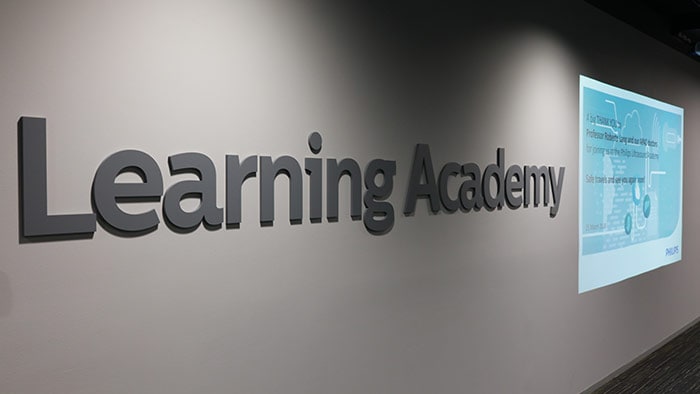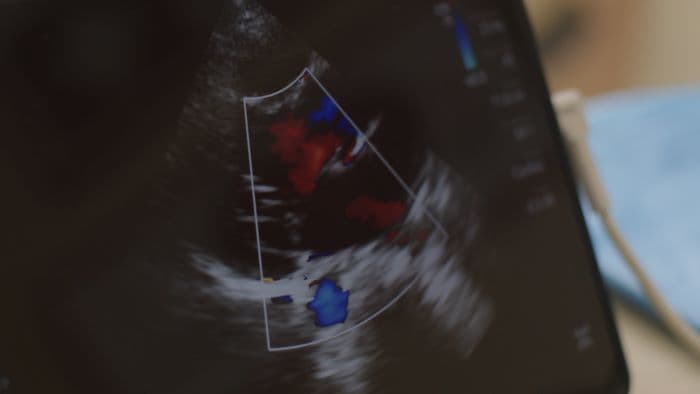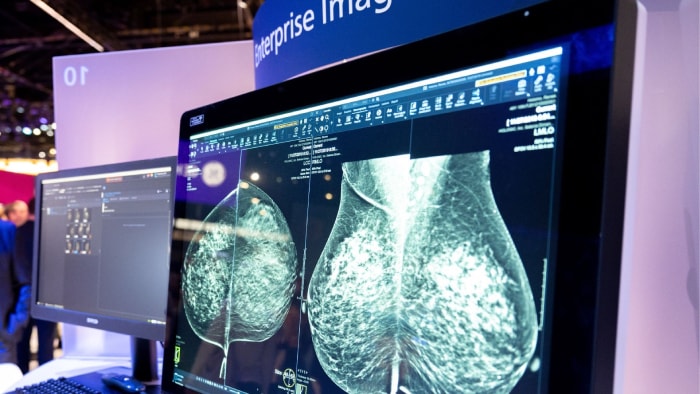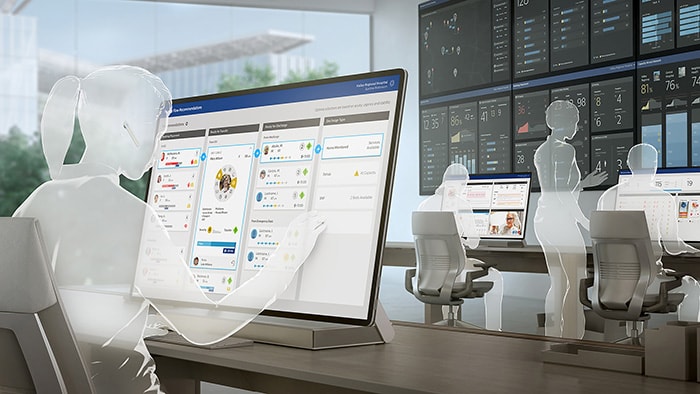Nov 13, 2018
Philips launches Learning Academy in Asia Pacific
Philips launches Learning Academy to drive continuing education for healthcare professionals
Singapore – Royal Philips (NYSE: PHG, AEX: PHIA), a global leader in health technology aims to upskill the region’s healthcare professionals with the introduction of Phillips Learning Academy at the Philips APAC Center, its regional headquarters in Singapore. The Learning Academy will host a pipeline of courses and workshops designed to upskill healthcare professionals in the clinical application of imaging technologies ranging from Ultrasound to Computed Tomography (CT) and Magnetic Resonance Imaging (MRI).
There is an urgent need to train more healthcare professionals, so they are proficient in the latest procedures and technologies to enable first-time right diagnosis and treatment in the most efficient manner,”
Diederik Zeven
General Manager, Health Systems, Philips ASEAN Pacific
From offering courses that allow healthcare professionals to increase product technical knowledge, enhance software applications skills, to fulfilling medical accreditation with advanced clinical techniques, the Learning Academy will introduce varying learning pathways for different specializations including Neuroradiology, Cardiology, Obstetrics and Gynecology and more to be added next year. An upcoming course, ‘From MRI Basics to Advanced Neuro Workshop’ is recommended for doctors, radiographers and biomedical engineers keen in the technical and scientific aspects of advanced Neuro MRI techniques.
Leveraging its global and regional network of partnerships with hospitals, healthcare professionals can look forward to peer-to-peer training courses and hands-on workshops conducted by regional and international experts. An inaugural workshop on Live 3D Echocardiography, an advanced imaging technique for the diagnosis of cardiac abnormalities was recently led by renowned echocardiologist, Professor Robert M. Lang, Director of the Noninvasive Cardiac Imaging Laboratory from the University of Chicago Medical Center, U.S.A.
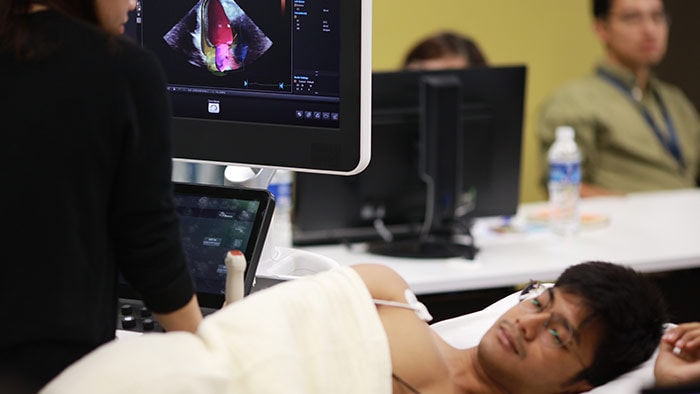
A demonstration on the acquisition of 3D images using Live 3D Echocardiography technique at Philips Learning Academy
“Live 3D Echocardiography is considered a relatively new ultrasound technique. With the advancement of ultrasound technologies and enhanced user training and education, it could be a powerful diagnostic tool in cardiology clinics in the coming years. In order to enhance the quality of care, Thomson Cardiology Centre at Thomson Medical Centre has started to incorporate Live 3D Echo as part of our ultrasound assessment, said Dr. Gerard Leong, Medical Director and Senior Consultant Cardiologist at Thomson Cardiology Center, Thomson Medical Centre. “This helps us to facilitate the diagnosis of early deterioration of cardiac functions, allowing for early interventions. The workshop by Prof. Lang provided a good update of the latest technologies to assess cardiac abnormalities, which helped to further enhance my knowledge and diagnostic confidence with Live 3D Echo,” added Dr. Leong. This trend is also evident in the 2018 Future Health Index (FHI), a research commissioned by Philips to help determine the readiness of countries in addressing global health challenges and in building efficient and effective health systems. Despite Singapore’s top performance across most metrics, the FHI identifies access to care as an area for improvement, with Singapore scoring below average on this. According to the report, this result was driven by a lower than average density of skilled healthcare professionals in relation to the size of the population.
To optimize the learning process Philips has taken an all-rounded approach to design an end-to-end experience. Right from the ease of registration to a conducive environment that facilitates interactive dialogues and hands-on demonstrations, the immersive design at the Learning Academy will be integral to cultivating a learning culture.
Philips is also set to launch these training courses across its extensive network of reference sites in the region to expand the Learning Academy’s reach and training in a clinical setting. This regional roll-out has started at the Cardiac Center King Chulalongkorn Memorial Hospital, where trainings of diagnostic and interventional cardiac imaging using 2D and advanced 3D techniques are being conducted to enhance healthcare professionals’ competency.
“With the Learning Academy housed at the Cardiac Center in the hospital, there are opportunities for participants to learn through lectures and live cases. We are confident that the Learning Academy will help to bridge knowledge gaps to enable more accurate diagnosis and more thorough interventions to improve patient outcomes,” said Dr. Smonporn Boonvaratavej, Director of Echocardiography and Noninvasive Laboratory at King Chulalongkorn Memorial Hospital in Thailand.
Home to more than half of the world’s population1, the Asia-Pacific region is facing a rapidly growing disease burden from aging and lifestyle changes. Yet, efforts to scale up on healthcare services are constrained by the shortage of qualified and skilled healthcare resources. Recent data from the International Labor Organization estimates a global deficit of over 10.3 million skilled health professionals, and more than half of the deficit, totaling 7.1 million (69%), is in Asia.2
“Today, we are challenged to meet the surging demand for healthcare with very limited resources and skilled professionals. There is an urgent need to train more healthcare professionals, so they are proficient in the latest procedures and technologies to enable first-time right diagnosis and treatment in the most efficient manner. As we continue to support healthcare professionals in the provision of quality diagnostic imaging, we are confident that the Learning Academy will soon pave the way for Phillips to support partners in their accreditation needs,” said Diederik Zeven, General Manager, Health Systems, Philips ASEAN Pacific.
More information on upcoming training courses can be found here.
1World Bank Group. Live long and prosper, aging in East Asia and Pacific. Washington, D.C 2016. https://openknowledge.worldbank.org/bitstream/handle/10986/23133/9781464804694.pdf. Accessed 16 June 2017. 2ILO. World Social Protection Report 2014/15. Geneva: International Labour Office; 2014. http://www.ilo.org/wcmsp5/groups/public/---dgreports/---dcomm/documents/publication/wcms_245201.pdf . Accessed 8 May 2018.
About Royal Philips
Royal Philips (NYSE: PHG, AEX: PHIA) is a leading health technology company focused on improving people's health and enabling better outcomes across the health continuum from healthy living and prevention, to diagnosis, treatment and home care. Philips leverages advanced technology and deep clinical and consumer insights to deliver integrated solutions. Headquartered in the Netherlands, the company is a leader in diagnostic imaging, image-guided therapy, patient monitoring and health informatics, as well as in consumer health and home care. Philips' health technology portfolio generated 2017 sales of EUR 17.8 billion and employs approximately 74,000 employees with sales and services in more than 100 countries. News about Philips can be found at www.philips.com/newscenter.

